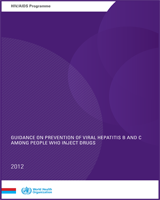The overall framework for the development of these guidelines is based on human rights principles reflected in a number of international agreements (53, 54). Stigma and discrimination remain significant problems for people living with HIV and for people who inject drugs. It is essential that this document adhere to basic tenets related to self-determination, privacy, informed decision-making and protection.
5.1. Human rights
Fundamental to the development of these guidelines is the protection of human rights for people who inject drugs. Legislators and other government authorities should establish and enforce antidiscrimination and protective laws, derived from international human rights standards, in order to eliminate stigma, discrimination and violence faced by PWID and to reduce their vulnerability to infection with viral hepatitis and other bloodborne infections (54).
5.2. Access to health care
Access to health care is a universal and basic human right. It includes the right of individuals who use drugs to have access to appropriate health care without discrimination. Nonetheless, access to health care is not equitable. PWID are particularly vulnerable to poor access for many reasons, including stigma and discrimination, high incarceration rates, poor health literacy and low socioeconomic status. In addition, PWID have high rates of poor health no matter the context, including high rates not only of HIV and viral hepatitis but also of TB and other acute and chronic medical conditions. They are also more likely to have poor access to adequate shelter and food security.
Health-care providers and institutions should serve PWID based on the principles of medical ethics and the right to health (55). Health services should be accessible to PWID. For instance, the location and opening hours should be convenient for PWID. The recommendations in this guidance can be effective only with implementation on a wide scale. Poor access to these interventions will impede their impact on the prevalence of viral hepatitis among PWID and on public health in general.
5.3. Access to justice
Access to justice is particularly relevant to PWID, given their high rates of contact with law enforcement services due to the illegality of drugs and of drug injection in many countries. Access to justice includes freedom from arbitrary arrest and detention, the right to a fair trial, freedom from torture and cruel, inhuman and degrading treatment and the right, even in closed settings (56), to the highest attainable standard of health.
Drug use has legal implications in many jurisdictions. As a consequence, the incarceration rates of PWID are high in many countries. For those not incarcerated, regular contact with law enforcement agencies is common. The protection of human rights, including the rights to employment, housing and health care for PWID, requires the collaboration of law enforcement agencies, including those responsible for the management of closed settings, with health-care agencies. Detainment in closed settings should not impede the right to maintain dignity and health (55).
5.4. Acceptability of services
Acceptability of services is a key component of effectiveness. Interventions to reduce the burden of viral hepatitis among PWID must be acceptable and appropriate to recipients in order to enlist their participation and ensure their retention in care. Although services working with PWID often apply appropriate models of service delivery, expertise in viral hepatitis is often lacking. Conversely, services specializing in viral hepatitis may not necessarily be acceptable to drug users. Hence, there is a need to build service capacity on both fronts. Adequate consultation with drug users' organizations and including drug users (known as peer workers) in service delivery are effective ways to work towards this goal.
5.5. Health literacy
PWID often lack sufficient health and treatment literacy, and this lack may impede their informed decision-making on drug use and health-seeking behaviour. Health services should regularly and routinely provide evidence-based health and treatment information to PWID, including information about viral hepatitis, its prevention and care and treatment options. Correspondingly, health services should strengthen providers' knowledge and capacity to prevent and to treat viral hepatitis in PWID.
5.6. Integrated service provision
PWID commonly have multiple co-morbidities and poor social situations. For example, HIV, viral hepatitis and other infectious diseases are prevalent in PWID, as are mental health conditions. PWID are also less likely to be employed or to have stable social relationships or adequate incomes. Integrated services provide the opportunity for patient-centred prevention, care and treatment for the multitude of issues adversely affecting PWID. In addition, integrated services enhance the likelihood of improved communication among, and thus of better care by, the different service providers working with PWID. Thus, wherever possible, service delivery for PWID should be integrated. When integrated service provision is not possible, strong links among health services working with PWID should be established and maintained (57).

